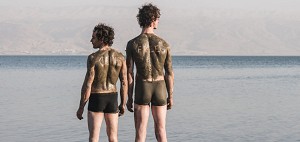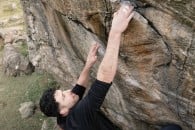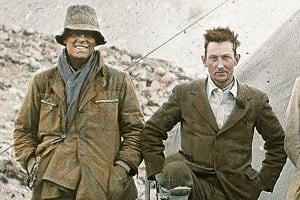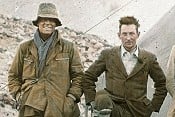
I didn't watch Resistance Climbing when it first came out, which is perhaps surprising, as it married what have been two of the biggest influences in my life over the past six or seven years, Palestine and climbing.
At the end of February 2019, I was roughly a year and a half into a PhD looking at literary representations of the oppression of Palestinians, and about two weeks into my newfound relationship with climbing. In the times between reading translated Palestinian literature, accounts of the Nakba, and books about memory and trauma, I was struggling my way up 4s and 5s at the University climbing wall, tending to raw fingers, and convincing myself that my appalling footwork was all because I hadn't yet committed to buying a pair of La Sportiva Miuras.
It is likely in part because climbing represented an escape from thinking about my studies that, when I first heard about Resistance Climbing, it was something I couldn't quite get my head around.
These two worlds were so far apart, so very different, it seemed unlikely to me that this film could bring them together in any way that didn't feel forced or contrived. I feared it would be a film where climbing was the filmmaker's primary interest, and the oppression of the Palestinian people was little more than an abitrary site of human suffering and dispossession, used to add a political and topical slant to what would otherwise be just another 'film about climbing'.
Fortunately, the filmmakers were aware that viewers might think this, and they used the first minute of the film to tell us otherwise.
'Climbing used to mean everything to me'. The very first sentence of the film rejects the assumption that this film is just a love letter to climbing, set against a backdrop of Palestinian pain. Thirty seconds later, and the film's narrator and central character, Andrew Bisharat, is calling out 'empty gestures to the latest cause du jour'. In fact, contrary to my suspicions about the film, Bisharat ends his opening remarks by saying 'these days, I can't seem to muster a paragraph about why climbing matters at all'.
Enter Tim Bruns. Where Bisharat is uninspired, skeptical, and jaded, Bruns - from the moment he is on screen - is animated, optimistic, and very much alive.
'He's young, idealistic, and he insists that climbing really matters', Bisharat says.
'I believe in the power of rock-climbing to change people's lives… Andrew is maybe, like, slightly grumpier than I am', Bruns replies.
And so, the stage is set. Bruns, a young idealistic American living in Palestine, invites Bisharat, an older and wearier American of Palestinian descent living in America, to visit him in Palestine, and to see how climbing can be a 'tool for social change'.
The thirty-five minutes that follow introduce us to the limestone cliffs of the West Bank, as well as the broad variety of characters that Bruns has led to them.
There's Inas, who tells us that she began climbing 'to release myself of my thoughts' after the Gaza War of 2014. There's Laith, who says that he waits every week for Friday, when the group gathers and goes to the crag, who says that 'living in a place like Palestine, you really need these moments when you can feel free, not think about the occupation'. There's Tawfiq, Tim's very first climbing recruit, a Bedouin who is seeking to equal the hardest route climbed by a Palestinian before Bisharat leaves, and whose very presence demonstrates the barriers that climbing is able to break down.
Yet, in and amongst the stories of climbing and all it offers to these people, we see also a story of life curtailed.
We hear of the armed settlers who stop Palestinian development of new climbing areas, and the soldiers that threaten imprisonment if their orders to leave are not followed immediately.
We see the illegal Israeli settlement that blocks direct access to Ein Fara nature reserve, allowing swift crag access to Israelis and Foreigners, but forcing Palestinians to hike for an hour to reach the same point.
We hear of the night raids that happen on Palestinian homes, and the arrests that happen if anyone dares to protest.
We learn of the lands, worked by Palestinian hands for generations, only to be blocked off by Israeli settlements, and for the water supply to be cut off.

We are reminded of Faris Odeh, the Palestinian child photographed throwing a rock at an Israeli tank, who was killed whilst throwing stones at Israeli troops at the age of 14. We are reminded of Shireen Abu Akleh, the Palestinian-American journalist, who, just over two years ago, was shot in the head by an Israeli soldier whilst covering a raid on the Jenin refugee camp.
As the film goes on, and these abuses come together to build a more comprehensive vision of the all-encompassing system of dispossession and oppression that exists in the Palestinian territories, the question as to how climbing is meant to have any meaningful effect on the plight of the Palestinian people falls away. Climbing alone, of course, cannot put an end to this.
And yet, as Faris - named after Faris Odeh - tells Bisharat, 'Existing is resistance here. Just existing here you're considered as someone who is resisting this occupation, because their whole history is trying to get rid of us'.
If to exist is to resist, then to climb - and to find joy in one's existence, in spite of the oppressive and violent practices of the Israeli state - is to make that resistance even more forceful.
At a time when depictions of Palestinians focus almost exclusively on suffering, grief, and death, it feels peculiarly jarring to see Palestinian joy. Yet, in witnessing the happiness of the Palestinians in Resistance Climbing, we are given a chance to focus on the individuality of a people too often reduced to numbers, made aware of the hopes and dreams that every Palestinian has - whether related to climbing or not - and reminded of the fact that this complexity and originality existed within each of the more than 34,000 Palestinians that have been killed by the Israeli state since October 7th, as well as the many thousands that were killed before then.
*
At the end of the film, Bisharat re-enters Israel, and travels to wealthy Israeli neighbourhood to visit the home that his family built, and that his grandfather once lived in. He stands in the garden, and wipes tears from his eyes. As he leaves, he takes two limes from a tree.
'I took two limes', he tells the camera, once outside the front gates. He chuckles awkwardly. 'These are mine now', he says. Under different circumstances, they would never have not been.
Last night, as the sun set on Israel's National Day of Independence, the people of Palestine entered their 76th year of displacement and dispossession. The past year, the 75th, has been the deadliest to date.
Whilst climbing is unlikely to change anything in Palestine on a grand scale, it nonetheless represents a lifeline for those Palestinians seeking joy and escapism, in lands surrounded by walls, where happiness is made fragile.
So, for anyone who struggles to conceive of just how important climbing can be, watch Resistance Climbing. Or, maybe, when the time is right, heed Laith's response to the suggestion that climbing is meaningless - 'come to Palestine, and you will see'.
Reel Rock have made Resistance Climbing free to watch, you can watch it here.
- REVIEW: Montane Men's Resolve XT Jacket 20 May
- INTERVIEW: Aidan Roberts on climbing Arrival of the Birds and Spots of Time 16 May
- ARTICLE: Who would have won Tokyo 2020 under the Paris 2024 scoring system? 27 Apr
- INTERVIEW: Jack Palmieri on climbing 200 8s in a year 15 Mar
- INTERVIEW: Robbie Phillips on his Voyage to St Kilda 11 Dec, 2023
- FEATURE: Kendal 2023 - E12? There and back again with James Pearson 2 Nov, 2023
- FEATURE: BMC Launches Crowdfunding Campaign to Secure Sirhowy Crag for Climbing Community 24 Oct, 2023
- INTERVIEW: Freja Shannon talks Risk, Craic, and Brit Rock 4 Oct, 2023
- ARTICLE: Kendal 2023: The Future of Hard Bouldering - Will Bosi, Jerry Moffatt, Shauna Coxsey 25 Sep, 2023
- VIDEO: Ryuichi Murai's First Ascent of Nexus, 8C+ 5 Jun, 2023






















Comments
Nice article. I really enjoyed the film, and had similar a priori's as you.
It's good to finally see something on UKC, however utterly belated, that acknowledges the genocide occuring before our eyes. It's just a shame that it is so tangential, framed as a strangely 5-year-belated film review... I wonder if in another 5 years, UKC's eds will feel it is safe enough to declare that this genocide is wrong... possibly in the form of a nostalgic essay about the music they were listening to in the summer of 2024.
If UKC had helped to publicise the recent "Climb the Wall" event (April 12 - May 5, 2024), which raised almost $90,000 for medical and aid charities and saw volunteers around the world climb over 366km, it might have had a much bigger profile in the UK. Sadly, despite Awesome Walls doing an awesome job of running an event, and some UK-based instructors donating prizes, the UK climbing community was under-represented. The only post I saw on UKC was my own, which a mod saw fit to consign to the dark oblivion of the Politics forum dungeon. So it goes...
I feel perfectly safe declaring that the genocide occurring in Palestine is wrong - I spent four years of my life researching, writing, and speaking about it.
Whilst my own engagement with Palestine began in 2019 - five years ago - Resistance Climbing came out just over a year ago, and was made free to watch around six months ago. Prior to that, I hadn't watched it. For me, it seemed like a logical way to address the ongoing oppression of Palestinians whilst also keeping the editorial content relevant to this website.
Thanks for the response Xa. It seems I misunderstood when the film came out (and I agree it's a great film, btw). My other points stand: given how much UKC content appeared in relation to Ukraine, UKC has been conspicuously quiet about the genocide in Palestine. Thanks for finally breaking that silence - a contribution like this has been long overdue.
i, too, had the same fears before watching, and came out surprised that bisharat made something so heartfelt. i had been familiar with his writing and was definitely not optimistic about his brand of tone-deaf edgelordery applied to matters concerning palestine.
but i am very glad to have been wrong.